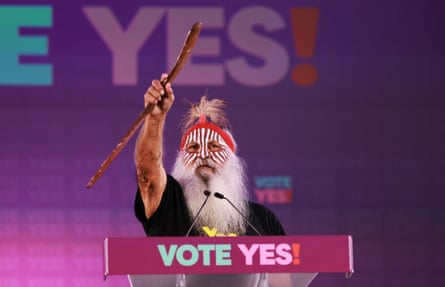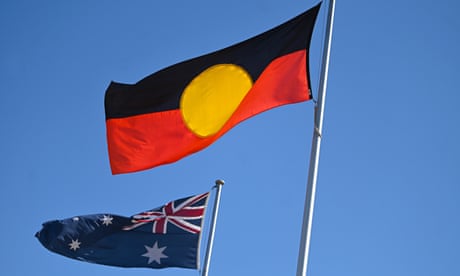PM says 14 October referendum is a ‘once-in-a-generation chance to bring our country together’ as both sides accuse each other of peddling misinformation
Lorena Allam
Indigenous affairs editor
THE GUARDIAN
Wed 30 Aug 2023
In 45 days, Australians will vote on whether to change the constitution to enshrine an Indigenous voice to parliament, the culmination of a six-year campaign by Indigenous leaders who say a it will be a big step towards a “fuller expression of nationhood”.
The voice would be a representative group of Indigenous people to advise parliament and the government on matters affecting Indigenous communities.
The referendum – about which an already vitriolic and racially charged campaign has been waged between “yes” advocates and “no” opponents – will be held on 14 October.
The prime minister, Anthony Albanese, announced the date at a rally in the South Australian city of Adelaide on Wednesday, saying it was a “once-in-a-generation chance to bring our country together”.
“On October 14, there’s nothing for us to lose. And there’s so much for Australia to gain. There is no downside here, only upside,” Albanese said.
“Many times when I’ve spoken about this change I’ve asked: ‘If not now, when?’ This is it. October 14 is our time. It’s our chance. It’s a moment calling out to the best of our Australian character. For Aboriginal and Torres Strait Islander people this has been a marathon. For all of us, it is now a sprint. And across the finish line is a more unified, more reconciled Australia, with greater opportunities for all.”

In 45 days, Australians will vote on whether to change the constitution to enshrine an Indigenous voice to parliament, the culmination of a six-year campaign by Indigenous leaders who say a it will be a big step towards a “fuller expression of nationhood”.
The voice would be a representative group of Indigenous people to advise parliament and the government on matters affecting Indigenous communities.
The referendum – about which an already vitriolic and racially charged campaign has been waged between “yes” advocates and “no” opponents – will be held on 14 October.
The prime minister, Anthony Albanese, announced the date at a rally in the South Australian city of Adelaide on Wednesday, saying it was a “once-in-a-generation chance to bring our country together”.
“On October 14, there’s nothing for us to lose. And there’s so much for Australia to gain. There is no downside here, only upside,” Albanese said.
“Many times when I’ve spoken about this change I’ve asked: ‘If not now, when?’ This is it. October 14 is our time. It’s our chance. It’s a moment calling out to the best of our Australian character. For Aboriginal and Torres Strait Islander people this has been a marathon. For all of us, it is now a sprint. And across the finish line is a more unified, more reconciled Australia, with greater opportunities for all.”

Major Sumner performs a welcome to country at the ‘yes’ campaign event in Adelaide on Wednesday. Photograph: James Elsby/Getty Images
The voice proposal was first put to the Australian people in the Uluru Statement from the Heart in 2017. Albanese is the first prime minister to commit to implementing the statement “in full”, the first step being the establishment of an Indigenous advisory body, followed by a process of treaty-making and truth-telling.
The Uluru statement called for that advisory body to be enshrined in the constitution so it could not be removed by the government of the day, providing a permanent means by which Indigenous people could be consulted.
Constitutional amendments can be made only by the Australian people at a referendum. The bar to success is high. A referendum requires a double majority to pass, meaning a majority of voters nationally must approve it, as well as at least four of the country’s six states.

What is the Indigenous voice to parliament, how would it work, and what happens next?
It will be Australia’s first referendum day since 1999, when voters decided not to become a republic. Referendums are rarely successful in Australia. Since 1901 there have been 44 proposed changes to the constitution, and only eight have been successful.
Polls show support for the voice to parliament has dropped over the past 12 months, indicating the key message of the “no” campaign – that the voice is divisive and unnecessary – is cutting through.
The “yes” campaign sees young people and women in the suburbs and cities as its champions, and is banking on a massive grassroots push. More than 35,000 community volunteers have signed up to the “yes” campaign. It has more than $60m in donations and broad community support. A majority of ASX top 20 companies support the voice, as well as the majority of sporting codes, from cricket to rugby, and every major religious faith in Australia.
Opposition parties, the Liberals and Nationals, strongly oppose the voice, and this lack of bipartisan support has been seen as the greatest blow to the referendum’s chance of success.
The key “no” spokespeople are the Indigenous conservative senator, Jacinta Nampijinpa Price and Aboriginal businessman Nyunggai Warren Mundine, who are backed by conservative group Fair Australia, itself an arm of a conservative lobby group called Advance. The groups have deep links to a number of conservative Christian organisations and consultancies, and have been accused by the government of importing “Trump-style” political campaigning to Australia.
Advance has been running three different social media strategies, targeting different groups of Australians with apparently contradictory messages. One Facebook page highlights conservative criticism, another highlights progressive complaints, and a third portrays itself as a neutral news source.
The campaign has been intense. Each side has accused the other of peddling misinformation about the voice, while some conservative “no” campaigners have been accused of using racist stereotypes.
A leading “no” campaigner, former Labor politician Gary Johns, rejected calls to resign and denied he had anything to apologise for after suggesting Indigenous people should undergo blood tests to access welfare benefits.
“If you want a voice, learn English. That’s your voice,” Johns told an audience of conservatives earlier in August.
The “yes” camp argues the voice is a roadmap to a solution to improving outcomes for Indigenous people who remain among the most disadvantaged people in the country.
“This is a campaign of two future Australias,” said Prof Megan Davis, an Indigenous woman who is a professor of constitutional law and a leading proponent of the voice.
“One [future Australia] is backward-looking, negative, pessimistic, has a very deep racial undertone, bullying – and the other is a vision for Australia that was developed by First Nations people, that opens its arms up, is positive and forward-looking and has huge numbers of Gen Z and millennials who say they want their future to be inclusive.”
The voice proposal was first put to the Australian people in the Uluru Statement from the Heart in 2017. Albanese is the first prime minister to commit to implementing the statement “in full”, the first step being the establishment of an Indigenous advisory body, followed by a process of treaty-making and truth-telling.
The Uluru statement called for that advisory body to be enshrined in the constitution so it could not be removed by the government of the day, providing a permanent means by which Indigenous people could be consulted.
Constitutional amendments can be made only by the Australian people at a referendum. The bar to success is high. A referendum requires a double majority to pass, meaning a majority of voters nationally must approve it, as well as at least four of the country’s six states.

What is the Indigenous voice to parliament, how would it work, and what happens next?
It will be Australia’s first referendum day since 1999, when voters decided not to become a republic. Referendums are rarely successful in Australia. Since 1901 there have been 44 proposed changes to the constitution, and only eight have been successful.
Polls show support for the voice to parliament has dropped over the past 12 months, indicating the key message of the “no” campaign – that the voice is divisive and unnecessary – is cutting through.
The “yes” campaign sees young people and women in the suburbs and cities as its champions, and is banking on a massive grassroots push. More than 35,000 community volunteers have signed up to the “yes” campaign. It has more than $60m in donations and broad community support. A majority of ASX top 20 companies support the voice, as well as the majority of sporting codes, from cricket to rugby, and every major religious faith in Australia.
Opposition parties, the Liberals and Nationals, strongly oppose the voice, and this lack of bipartisan support has been seen as the greatest blow to the referendum’s chance of success.
The key “no” spokespeople are the Indigenous conservative senator, Jacinta Nampijinpa Price and Aboriginal businessman Nyunggai Warren Mundine, who are backed by conservative group Fair Australia, itself an arm of a conservative lobby group called Advance. The groups have deep links to a number of conservative Christian organisations and consultancies, and have been accused by the government of importing “Trump-style” political campaigning to Australia.
Advance has been running three different social media strategies, targeting different groups of Australians with apparently contradictory messages. One Facebook page highlights conservative criticism, another highlights progressive complaints, and a third portrays itself as a neutral news source.
The campaign has been intense. Each side has accused the other of peddling misinformation about the voice, while some conservative “no” campaigners have been accused of using racist stereotypes.
A leading “no” campaigner, former Labor politician Gary Johns, rejected calls to resign and denied he had anything to apologise for after suggesting Indigenous people should undergo blood tests to access welfare benefits.
“If you want a voice, learn English. That’s your voice,” Johns told an audience of conservatives earlier in August.
The “yes” camp argues the voice is a roadmap to a solution to improving outcomes for Indigenous people who remain among the most disadvantaged people in the country.
“This is a campaign of two future Australias,” said Prof Megan Davis, an Indigenous woman who is a professor of constitutional law and a leading proponent of the voice.
“One [future Australia] is backward-looking, negative, pessimistic, has a very deep racial undertone, bullying – and the other is a vision for Australia that was developed by First Nations people, that opens its arms up, is positive and forward-looking and has huge numbers of Gen Z and millennials who say they want their future to be inclusive.”
No comments:
Post a Comment